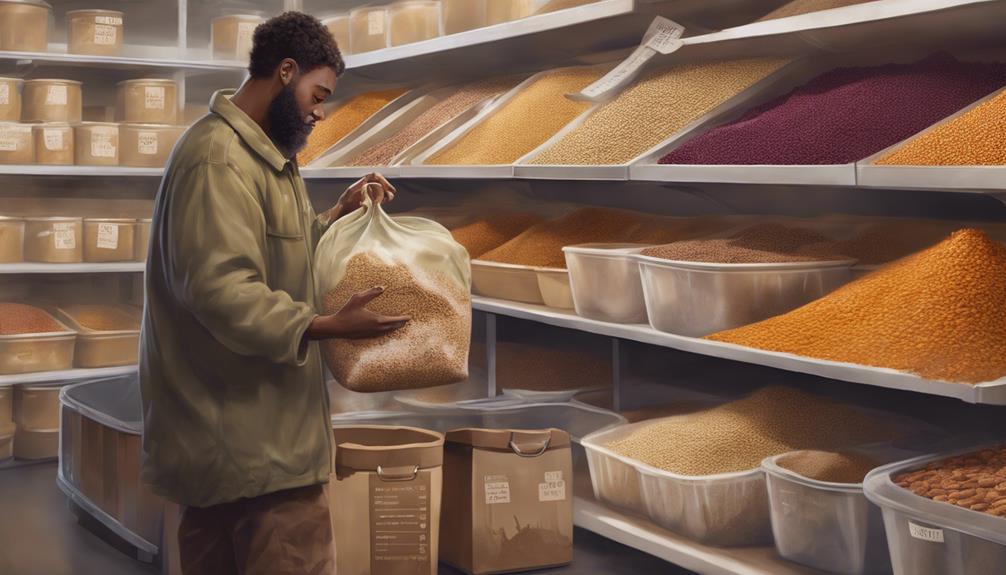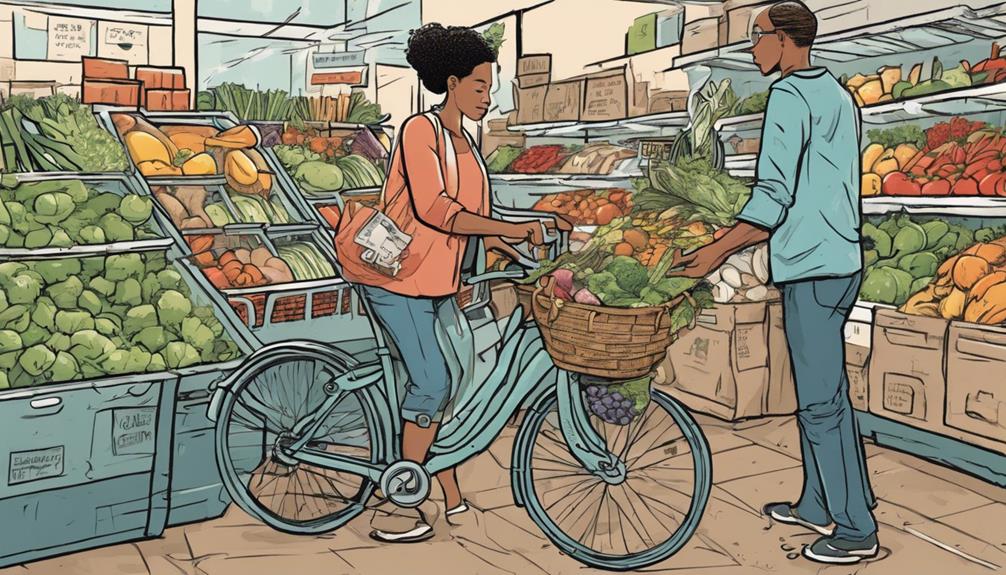Embrace sustainable living to save money effortlessly. Maintain HVAC filters for better air quality. Adjust thermostat to save energy when away. Use a drying rack instead of a dryer. Switch to energy-efficient bulbs. Choose reusable shopping bags and beeswax wraps. Reduce waste with sustainable eating and food management. Opt for reusable water bottles and avoid single-use plastics. Practice sustainable shopping like bulk purchasing and secondhand shopping. Repair items instead of replacing them. Prioritize quality goods. These eco-friendly habits not only benefit the environment but also your wallet.
Key Takeaways
- Opt for plant-based diets for cost savings and reduced emissions.
- Use reusable shopping bags to save money and reduce plastic waste.
- Repair items instead of replacing to minimize environmental impact and expenses.
- Choose quality over quantity for durable goods that support sustainability.
- Embrace bulk purchasing to lower carbon footprint, reduce waste, and save money.
Energy Efficiency

To enhance your sustainable living practices, prioritize energy efficiency in your daily habits. Regularly maintaining your HVAC filters not only improves air quality but also guarantees energy efficiency in your home.
By adjusting your thermostat by 7-10 degrees when away, you can achieve significant energy savings. Opting for a drying rack instead of a dryer not only saves energy but also diminishes greenhouse gas emissions.
Additionally, switching to energy-efficient bulbs like LEDs, CFLs, or halogen bulbs can lower electricity usage and save you money over time. Another way to enhance energy efficiency is by adding insulated curtains to your windows. These curtains help regulate indoor temperature, reducing the need for constant heating or cooling, hence further reducing energy consumption.
Reusable Alternatives

You can make a significant impact by choosing reusable shopping bags and Beeswax Wrap in your daily routine. These alternatives not only help save money in the long run but also contribute to a more sustainable lifestyle by reducing plastic waste.
Reusable Shopping Bags
How can reusable shopping bags be a sustainable alternative to single-use plastic bags?
Reusable shopping bags offer a simple yet powerful way to combat plastic waste and environmental harm. Here are some reasons why reusable shopping bags are beneficial:
- Reduction of Plastic Waste: By using reusable shopping bags, you can replace hundreds of single-use plastic bags, decreasing plastic waste.
- Environmental Impact: Americans annually use around 100 billion plastic bags, contributing to plastic pollution. Opting for reusable alternatives helps mitigate this environmental impact.
- Cost-Effective: Investing in reusable shopping bags may seem like a small expense initially, but it saves money in the long run by eliminating the need to purchase single-use bags repeatedly.
- Legislation Support: Various cities and states have implemented bans or fees on single-use plastic bags to encourage the use of reusable alternatives.
- Individual Contribution: Choosing reusable shopping bags empowers individuals to play a significant role in reducing plastic pollution and fostering sustainable living practices.
Beeswax Wrap Benefits
Beeswax wraps, a sustainable alternative to plastic wrap, offer a versatile and eco-friendly solution for reducing single-use plastic waste in your kitchen.
These wraps, made from cotton infused with beeswax, tree resin, and jojoba oil, are reusable and washable, lasting up to a year with proper care.
Their versatility allows you to wrap food, cover bowls, or store produce, helping to maintain freshness while reducing environmental impact.
Beeswax wraps are biodegradable and compostable, making them an excellent eco-friendly choice.
By using beeswax wraps, you not only contribute to waste reduction but also save money in the long run by eliminating the need for single-use plastic wraps and aluminum foil.
Make the switch to beeswax wraps for a more sustainable and cost-effective way to store and preserve your food.
Waste Reduction Strategies
Consider incorporating reusable alternatives into your daily routine to effectively reduce waste and minimize your environmental impact. Here are some simple yet impactful waste reduction strategies:
- Swap plastic wrap for Beeswax Wrap to cut down on plastic waste in your kitchen.
- Use reusable towels and mops instead of disposable ones to decrease the amount of trash generated.
- Carry a reusable water bottle with you to avoid single-use plastic bottles and reduce plastic pollution.
- Bring a reusable shopping bag whenever you go shopping to eliminate the need for single-use plastic bags.
- Opt for sustainable options like plant-based diets and locally sourced organic produce to lower greenhouse gas emissions and promote eco-friendly practices.
Sustainable Eating

To eat sustainably, consider making plant-based choices to diminish your environmental impact. Plant-based diets not only contribute to lower greenhouse gas emissions but also offer health benefits and cost savings.
Eating less meat can notably decrease greenhouse gas emissions by up to 73% when compared to a typical diet. By opting for plant-based diets, you can save an average of $750 per year in comparison to a meat-heavy diet.
Supporting local organic produce is another way to reduce your carbon footprint, as it helps cut down on the environmental impact of food transportation. Additionally, sustainable meat options like grass-fed beef have a lower environmental impact than factory-farmed meat.
Embracing plant-based eating not only benefits your health but also positively impacts the environment, making it a win-win choice for both you and the planet.
Food Management

To manage your food effectively, start by reducing waste through freezing leftovers or meal planning to save money and resources.
Opt for plant-based diets and sustainable meat options to decrease greenhouse gas emissions.
Supporting local organic produce not only saves money but also promotes environmental sustainability.
Consider trying out creative leftover recipes to minimize food waste and stretch your budget.
Plastic Reduction

You can start reducing your plastic waste by opting for reusable water bottles instead of single-use plastic ones.
Make eco-friendly choices when shopping by selecting products with minimal packaging and using reusable bags.
Reduce Single-Use Plastics
By switching to reusable water bottles and avoiding single-use plastics, you can greatly reduce your environmental impact and help combat waste and pollution.
It's estimated that Americans use a staggering 50 billion water bottles every month, contributing remarkably to waste and pollution.
To curb this harmful trend, opt for reusable water bottles instead of plastic ones. By doing so, you not only reduce waste but also protect your health by avoiding potential harmful chemicals found in plastic products.
Say no to single-use plastics like straws and disposable cups by embracing permanent alternatives that can be used multiple times.
Additionally, opt for package-free bathroom products and seek out reusable alternatives to minimize plastic waste even further.
Small changes in your daily habits can make a big difference in reducing single-use plastics and promoting a more sustainable lifestyle.
Reusable Water Bottles
Switching to reusable water bottles presents a practical solution for reducing single-use plastic consumption and its detrimental impact on the environment. Americans use a staggering 50 billion plastic water bottles monthly, contributing notably to waste and pollution.
By opting for a reusable water bottle, you can actively reduce plastic waste and help protect the environment. Not only are reusable water bottles eco-friendly, but they're also a cost-effective choice. Making the switch allows you to save money that would otherwise be spent on buying bottled water regularly.
By incorporating this simple eco-friendly habit into your daily routine, you can make a positive impact on the environment while also benefiting your wallet. Choose a reusable water bottle that suits your style and needs, and make a conscious effort to carry it with you wherever you go.
Small actions like this can collectively lead to noteworthy reductions in plastic waste and help create a more sustainable future.
Eco-Friendly Shopping Choices
Opt for sustainable alternatives when shopping to reduce plastic use and minimize environmental impact. When making your grocery list, consider these eco-friendly shopping choices:
- Buying in Bulk: Purchase items like grains, nuts, and spices in bulk to reduce single-use packaging waste.
- Bring Your Own Reusable: Remember to bring your own reusable bags and containers when shopping to avoid plastic bags and packaging.
- Seasonal Produce: Opt for seasonal fruits and vegetables to support your local farmers and reduce the carbon footprint of your food.
- Single-Use Packaging: Avoid products with excessive single-use packaging and choose items with minimal or compostable packaging.
- Grocery Store: Choose to shop at environmentally friendly grocery stores that prioritize sustainable practices and offer plastic-free options.
Secondhand Shopping

When considering sustainable living practices, incorporating secondhand shopping into your lifestyle can have a significant positive impact on the environment and your wallet. Secondhand shopping not only allows you to save money but also promotes sustainability by reducing waste and lowering your environmental impact.
By choosing secondhand items, you support local businesses and contribute to a more sustainable community.
Shopping secondhand gives pre-loved items a new lease on life, extending their usability and diverting them from landfills. The lower prices of secondhand goods compared to new products make it a budget-friendly option that benefits both you and the environment.
Additionally, secondhand stores often offer unique and vintage items that add character to your purchases and may not be found in regular retail stores.
Opting for secondhand over new items helps decrease the demand for new production, which in turn reduces the energy and resources required for manufacturing processes.
Make a conscious choice to embrace secondhand shopping for a greener, more sustainable lifestyle.
Repair Instead of Replace

Consider repairing items instead of replacing them to reduce energy consumption and promote sustainability. Repairing instead of replacing can save up to 85% of the energy needed to make a new product.
Patching clothing instead of buying new can save an estimated 1,600 gallons of water per year per person. Varnishing old furniture instead of replacing it can reduce carbon emissions associated with furniture production.
Saving money on one-time use items by borrowing instead of buying promotes a sharing economy and reduces resource consumption. Normalizing the act of borrowing within the community can help reduce waste and minimize the environmental impact of constantly buying new items.
Bulk Purchasing

Buying in bulk not only helps you save money but also contributes to a more sustainable lifestyle by reducing packaging waste. When you purchase items in larger quantities, you can lower the cost per unit, resulting in significant savings over time. Additionally, buying in bulk allows you to stock up on essentials, reducing the need for frequent trips to the store. This not only saves you time but also helps minimize transportation emissions, thereby lowering your carbon footprint.
Consider the benefits of bulk purchasing:
| Benefits of Bulk Purchasing | ||
|---|---|---|
| Save money | Reduce packaging waste | Lower carbon footprint |
| Stock up on essentials | Minimize trips |
Embracing bulk purchasing not only helps you financially but also aligns with sustainable living practices. So next time you go shopping, consider buying in bulk to save money, reduce waste, and lessen your environmental impact.
Quality Over Quantity

Choosing quality over quantity when making purchases is key to fostering a sustainable lifestyle and reducing environmental impact. Opting for high-quality products leads to durable goods, which can save you money in the long run by reducing the need for frequent replacements.
Quality materials like organic cotton, bamboo, or hemp not only last longer but also contribute to a more sustainable consumption pattern. Prioritizing quality over quantity helps in minimizing waste and reducing the overall environmental impact.
By promoting the longevity of products, you support a more eco-friendly lifestyle that benefits both your wallet and the planet.
Investing in high-quality, durable products can save money in the long run by reducing the need for frequent replacements.
Quality materials like organic cotton, bamboo, or hemp last longer and are more sustainable than cheaper alternatives.
Choosing high-quality items over quantity helps in minimizing waste and reducing the overall environmental impact.
Prioritizing quality over quantity supports a more sustainable lifestyle by promoting the longevity of products.
Opting for durable goods not only saves money but also contributes to a more eco-friendly and sustainable consumption pattern.
Frequently Asked Questions
What Are Five Eco-Friendly Habits?
To live sustainably, you can save money by adopting eco-friendly habits. Use energy-efficient appliances, enjoy plant-based meals, shop locally, make homemade cleaners, and choose reusable items. These actions reduce costs and benefit the environment.
How Does Sustainability Save Money?
By making eco-conscious choices, you're putting more cash back in your pocket. Energy-efficient homes slash bills by 30%, reusable products cut down on wasteful spending, growing your own food trims grocery costs, and durable goods save in the long run.
How Can We Save Money and Save the Environment?
To save money and the environment, you can reduce energy use with efficient appliances, choose plant-based meals and local produce, opt for reusable products, and invest in quality items. These eco-friendly habits are cost-effective and sustainable.
What Are 5 Eco-Friendly Choices That Can Be Adopted in Our Everyday Life?
To make a positive impact daily, consider choosing LED lighting, opting for public transportation, washing clothes less, enjoying plant-based meals, and buying local produce. These habits can save money and help the environment simultaneously.
Conclusion
Incorporate these sustainable living tips into your daily routine to not only help the planet but also save money in the long run. Some sustainable living tips that can help you save money in the long run include reducing your energy usage by turning off lights and unplugging electronics when not in use, conserving water by fixing leaks and using a water-saving showerhead, and reducing waste by composting and recycling. These sustainable living practices not only benefit the environment but also your wallet by lowering utility bills and reducing the need to purchase new items. By incorporating these tips into your daily routine, you can make a positive impact on the planet while also improving your financial well-being.
By making small changes like switching to reusable alternatives, reducing plastic waste, and choosing quality over quantity, you can make a big impact on both your wallet and the environment.
Remember, every little bit counts in the journey towards a more eco-friendly lifestyle.
So why not take the leap and start making a difference today?









